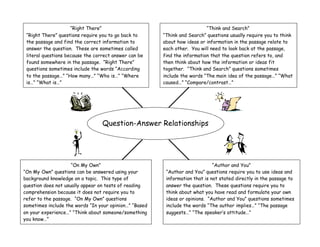Recommended
Recommended
More Related Content
What's hot
What's hot (20)
Critical Evaluation: Critical Reading & Critical Thinking

Critical Evaluation: Critical Reading & Critical Thinking
Viewers also liked
Viewers also liked (10)
Similar to Qar[1]
Similar to Qar[1] (20)
MLA Review 1 MLA Review Please read this week’s Lesso.docx

MLA Review 1 MLA Review Please read this week’s Lesso.docx
Assessment Assignment Helpful HintsAbridged version of the Gra.docx

Assessment Assignment Helpful HintsAbridged version of the Gra.docx
More from Liz Slavens
More from Liz Slavens (20)
2014 literary analysis of your enrichment book for summer reading

2014 literary analysis of your enrichment book for summer reading
Qar[1]
- 1. Question-Answer Relationships “Right There” “Right There” questions require you to go back to the passage and find the correct information to answer the question. These are sometimes called literal questions because the correct answer can be found somewhere in the passage. “Right There” questions sometimes include the words “According to the passage…” “How many…” “Who is…” “Where is…” “What is…” “Think and Search” “Think and Search” questions usually require you to think about how ideas or information in the passage relate to each other. You will need to look back at the passage, find the information that the question refers to, and then think about how the information or ideas fit together. “Think and Search” questions sometimes include the words “The main idea of the passage…” “What caused…” “Compare/contrast…” “Author and You” “Author and You” questions require you to use ideas and information that is not stated directly in the passage to answer the question. These questions require you to think about what you have read and formulate your own ideas or opinions. “Author and You” questions sometimes include the words “The author implies…” “The passage suggests…” “The speaker’s attitude…” “On My Own” “On My Own” questions can be answered using your background knowledge on a topic. This type of question does not usually appear on tests of reading comprehension because it does not require you to refer to the passage. “On My Own” questions sometimes include the words “In your opinion…” “Based on your experience…” “Think about someone/something you know…”
